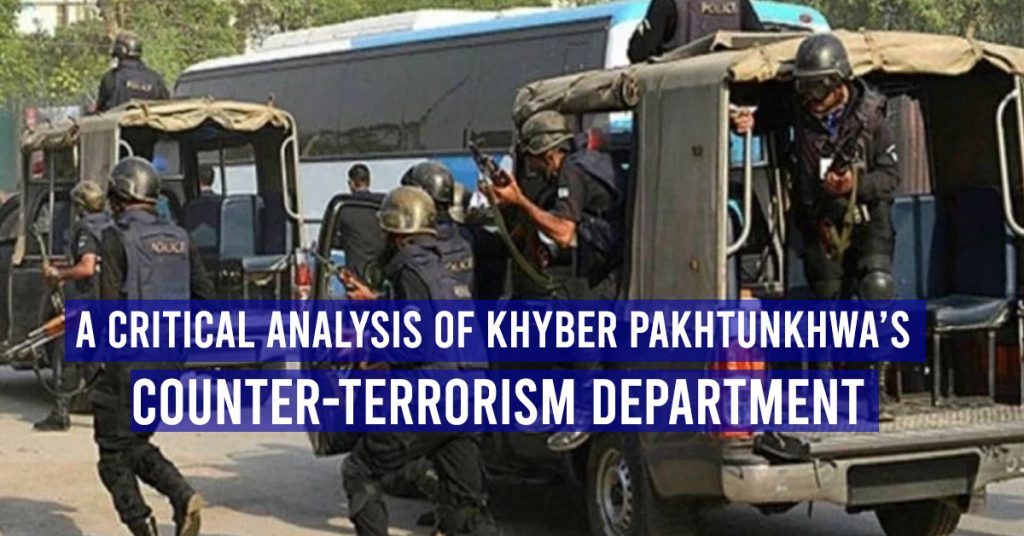Khyber Pakhtunkhwa: A Province Under Siege
For over two decades, Khyber Pakhtunkhwa (KP) has remained at the epicenter of Pakistan’s fight against terrorism. The province has witnessed countless att@cks, sacrifices, and efforts by law enforcement agencies (LEAs). Despite these challenges, Khyber Pakhtunkhwa’s Counter-Terrorism Department —a critical pillar in this fight—remains plagued by neglect, insufficient resources, and institutional inefficiency.
The provincial government’s failure to equip the CTD adequately not only undermines its operational readiness but also exposes the region to heightened risks. This neglect becomes even more glaring when KP’s CTD is compared to those in Punjab and Sindh, which are significantly better funded, staffed, and organized.
CTD KP: A Story of Neglect and Mismanagement
The CTD in KP has faced persistent challenges that highlight the provincial government’s lack of urgency and vision. Some key facts and figures paint a grim picture:
- Insufficient Workforce:
As of 2022, the CTD in KP had a mere 2,135 personnel, including non-operational staff like clerks, cooks, and drivers. Following widespread criticism after the Bannu CTD station att@ck, the force was expanded to 4,430 personnel. However, this increase remains insufficient given the scale of terrorism threats in the province. - Lack of Senior Officers:
Until 2022, KP’s CTD had only one senior officer acting as DIG, compared to Punjab’s CTD, which employs 18 senior officers and two DIGs. Although eight SPs were appointed to KP’s CTD in 2023, this is still inadequate to meet operational demands. - Meager Financial Resources:
While Punjab’s CTD boasts a “reward fund” of 27.6 crore PKR, KP’s CTD has only 2.5 crore PKR at its disposal. This disparity directly impacts the morale and effectiveness of personnel on the ground. - Training Deficiencies:
The KP CTD has not conducted any major counter-terrorism training programs in the past two years, nor has it received grants for such initiatives. Modern counter-terrorism requires highly specialized training and advanced forensic capabilities—areas where KP’s CTD lags significantly. - Corruption and Mismanagement:
A recruitment advertisement for CTD positions in KP drew thousands of applicants who collectively paid 2 crore PKR in fees. However, the process was abruptly canceled, highlighting administrative inefficiency and possible corruption.
A Stark Comparison: Punjab and Sindh vs. Khyber Pakhtunkhwa
The provincial government of KP has consistently failed to prioritize the CTD, resulting in a department that is woefully underprepared to tackle modern terrorism threats. In stark contrast:
- Punjab and Sindh have far better-equipped CTD units, with larger workforces, modern infrastructure, and access to advanced technologies.
- Forensic Dependency: KP’s CTD relies on Punjab’s facilities for data analysis and forensic support, further exposing its operational weakness.
These disparities underscore the provincial government’s negligence, leaving KP’s CTD ill-equipped to combat threats effectively.
Critique of Provincial Governance
The provincial government’s lack of investment in Khyber Pakhtunkhwa’s Counter-Terrorism Department raises serious questions about its commitment to protecting its citizens. Despite receiving approximately 500 billion PKR from the federal government between 2010 and 2024 for counter-terrorism efforts, these funds were not adequately utilized for strengthening the CTD. Even in the financial year 2023-24, out of 56 billion PKR allocated to the province, the CTD remained underfunded.
Furthermore, the “shaheed package” for KP’s CTD personnel is 150% lower than similar packages in Punjab and Sindh. This disparity demoralizes staff and discourages talented officers from joining the department.
The Path Forward: An Urgent Call for Reform
The fight against terrorism demands a proactive and well-equipped CTD in Khyber Pakhtunkhwa. The provincial government must take immediate action to address the department’s deficiencies:
- Allocate Adequate Funds: Invest in infrastructure, modern equipment, and operational capabilities to bring KP’s CTD at par with its counterparts in Punjab and Sindh.
- Enhance Training Programs: Establish regular, advanced training sessions for personnel, focusing on forensic science, intelligence gathering, and counter-terrorism tactics.
- Combat Corruption: Implement transparency and accountability measures to eliminate inefficiencies and ensure proper utilization of funds.
- Improve Morale: Revise the “shaheed package” to match or exceed that of other provinces, ensuring personnel feel valued and motivated.
Conclusion
Khyber Pakhtunkhwa has suffered the most in Pakistan’s war on terror, yet its CTD remains an under-resourced and under-prioritized entity. The provincial government’s negligence has not only weakened the department but also endangered the lives of its citizens. Strengthening the Khyber Pakhtunkhwa’s Counter-Terrorism Department CTD is not a luxury but an urgent necessity. If immediate reforms are not implemented, KP risks becoming a breeding ground for re-emerging terrorism, undoing the sacrifices made by its people and security forces.
By modernizing its CTD, KP can ensure a safer future for its citizens and reaffirm its commitment to countering the persistent threat of terrorism.


